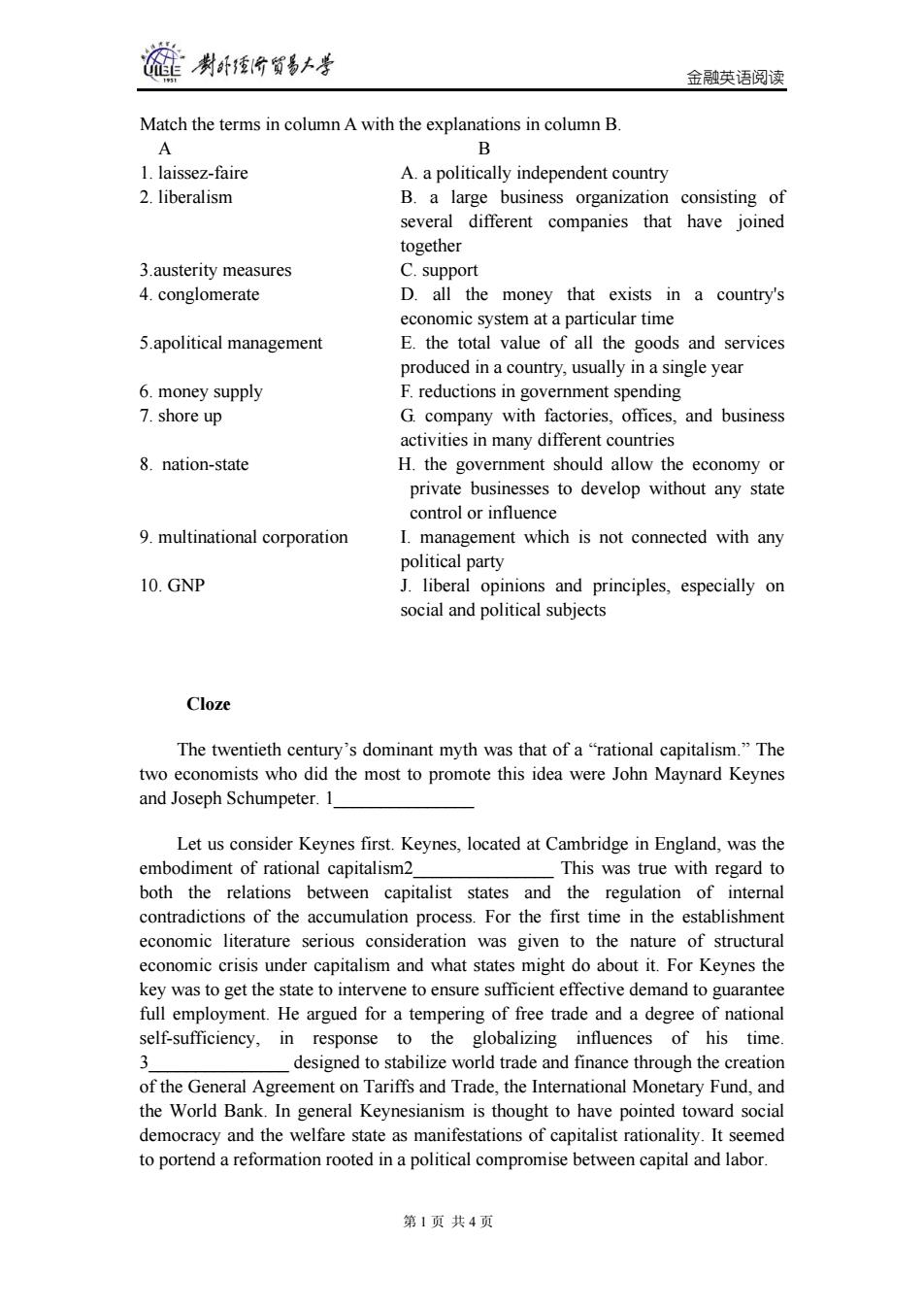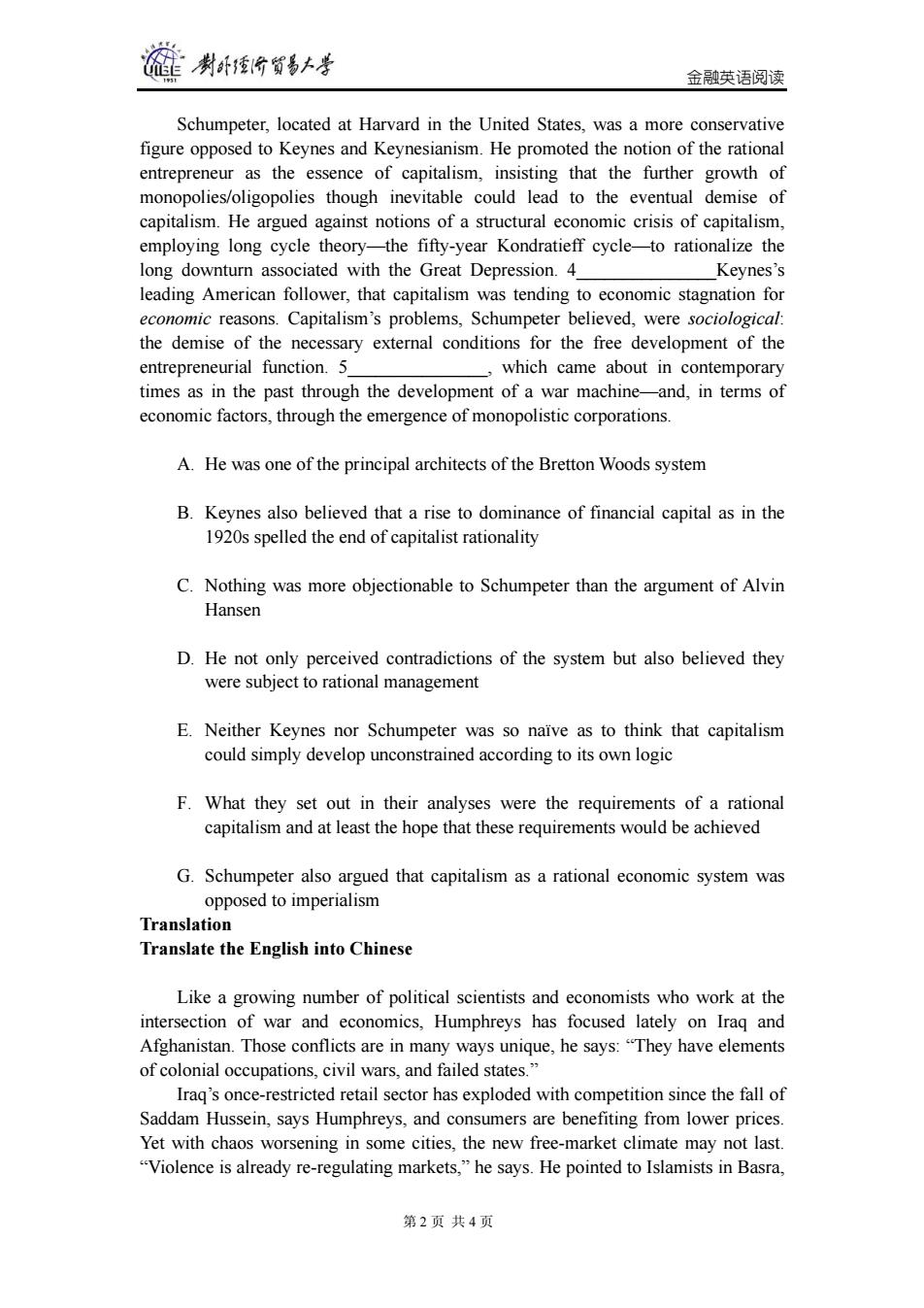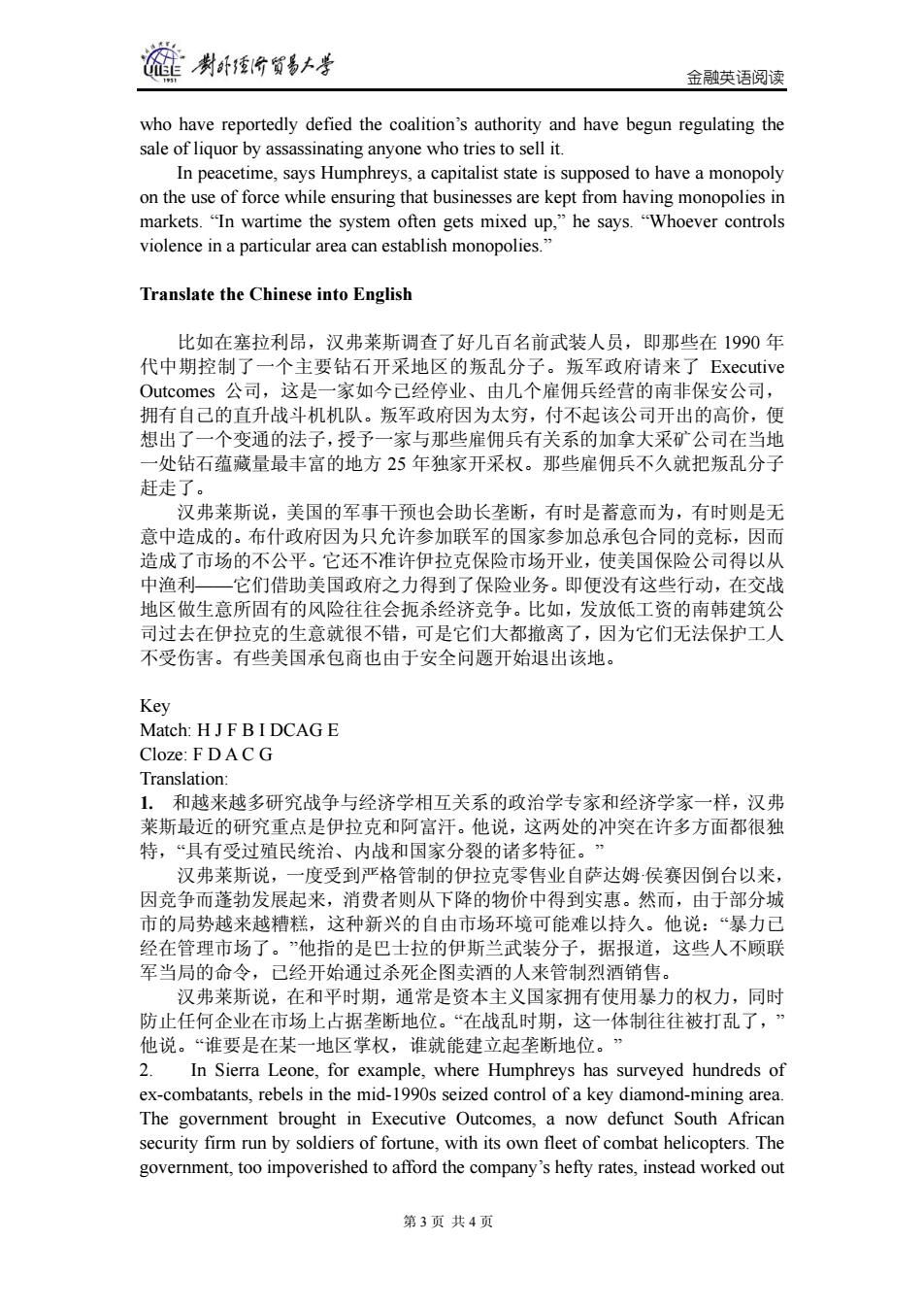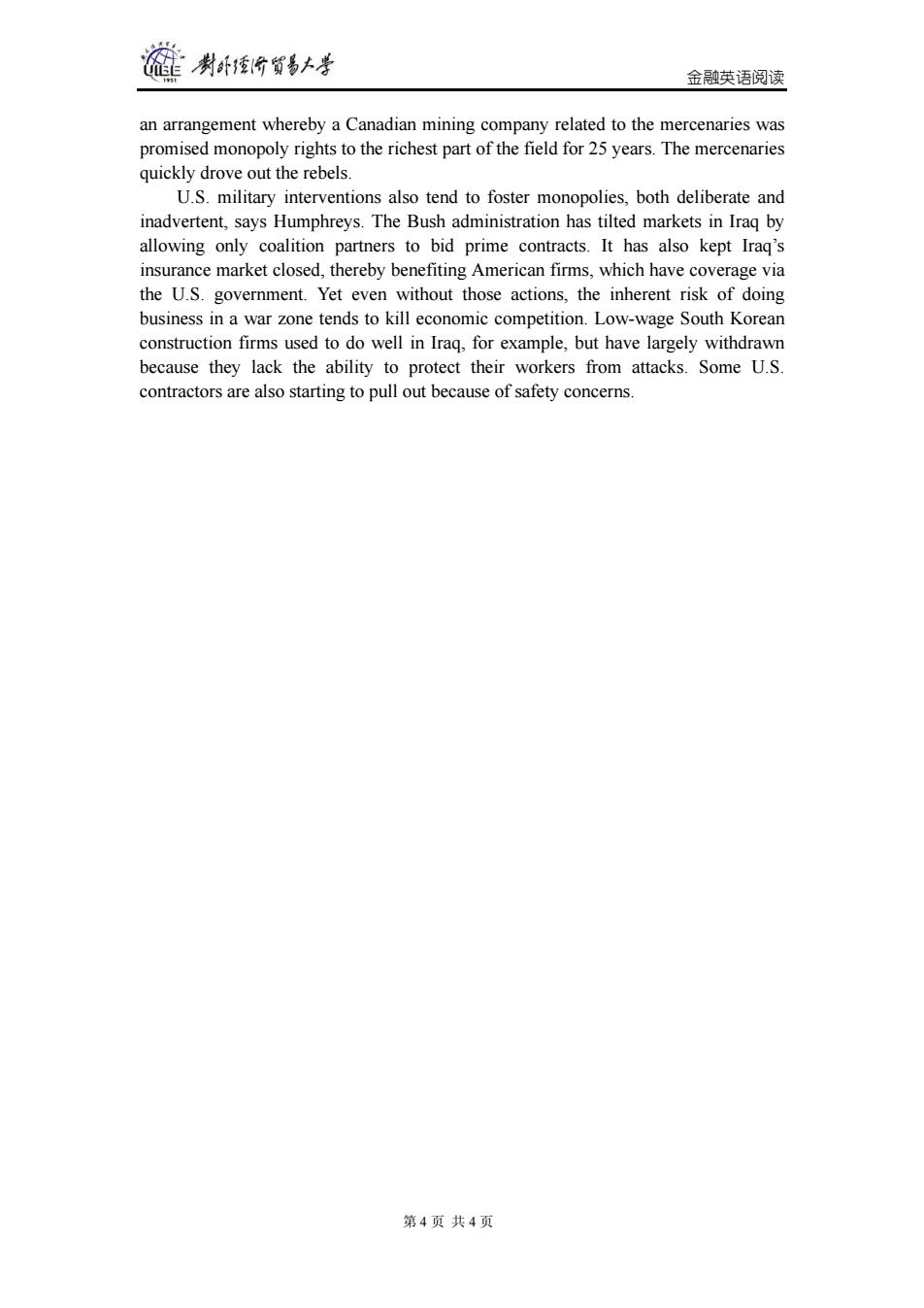
”制卧舍贸易上考 金融英语阅读 Match the terms in column A with the explanations in column B. A B 1.laissez-faire A.a politically independent country 2.liberalism B.a large business organization consisting of several different companies that have joined together 3.austerity measures C.support 4.conglomerate D.all the money that exists in a country's economic system at a particular time 5.apolitical management E.the total value of all the goods and services produced in a country,usually in a single year 6.money supply F.reductions in government spending 7.shore up G.company with factories,offices,and business activities in many different countries 8.nation-state H.the government should allow the economy or private businesses to develop without any state control or influence 9.multinational corporation I.management which is not connected with any political party 10.GNP J.liberal opinions and principles,especially on social and political subjects Cloze The twentieth century's dominant myth was that of a"rational capitalism."The two economists who did the most to promote this idea were John Maynard Keynes and Joseph Schumpeter.1 Let us consider Keynes first.Keynes,located at Cambridge in England,was the embodiment of rational capitalism2 This was true with regard to both the relations between capitalist states and the regulation of internal contradictions of the accumulation process.For the first time in the establishment economic literature serious consideration was given to the nature of structural economic crisis under capitalism and what states might do about it.For Keynes the key was to get the state to intervene to ensure sufficient effective demand to guarantee full employment.He argued for a tempering of free trade and a degree of national self-sufficiency,in response to the globalizing influences of his time. 3 designed to stabilize world trade and finance through the creation of the General Agreement on Tariffs and Trade,the International Monetary Fund,and the World Bank.In general Keynesianism is thought to have pointed toward social democracy and the welfare state as manifestations of capitalist rationality.It seemed to portend a reformation rooted in a political compromise between capital and labor. 第1页共4页
金融英语阅读 第 1 页 共 4 页 Match the terms in column A with the explanations in column B. A B 1. laissez-faire A. a politically independent country 2. liberalism B. a large business organization consisting of several different companies that have joined together 3.austerity measures C. support 4. conglomerate D. all the money that exists in a country's economic system at a particular time 5.apolitical management E. the total value of all the goods and services produced in a country, usually in a single year 6. money supply F. reductions in government spending 7. shore up G. company with factories, offices, and business activities in many different countries 8. nation-state H. the government should allow the economy or private businesses to develop without any state control or influence 9. multinational corporation I. management which is not connected with any political party 10. GNP J. liberal opinions and principles, especially on social and political subjects Cloze The twentieth century’s dominant myth was that of a “rational capitalism.” The two economists who did the most to promote this idea were John Maynard Keynes and Joseph Schumpeter. 1_______________ Let us consider Keynes first. Keynes, located at Cambridge in England, was the embodiment of rational capitalism2_______________ This was true with regard to both the relations between capitalist states and the regulation of internal contradictions of the accumulation process. For the first time in the establishment economic literature serious consideration was given to the nature of structural economic crisis under capitalism and what states might do about it. For Keynes the key was to get the state to intervene to ensure sufficient effective demand to guarantee full employment. He argued for a tempering of free trade and a degree of national self-sufficiency, in response to the globalizing influences of his time. 3_______________ designed to stabilize world trade and finance through the creation of the General Agreement on Tariffs and Trade, the International Monetary Fund, and the World Bank. In general Keynesianism is thought to have pointed toward social democracy and the welfare state as manifestations of capitalist rationality. It seemed to portend a reformation rooted in a political compromise between capital and labor

制卧价贸易上孝 金融英语阅读 Schumpeter,located at Harvard in the United States,was a more conservative figure opposed to Keynes and Keynesianism.He promoted the notion of the rational entrepreneur as the essence of capitalism,insisting that the further growth of monopolies/oligopolies though inevitable could lead to the eventual demise of capitalism.He argued against notions of a structural economic crisis of capitalism, employing long cycle theory-the fifty-year Kondratieff cycle-to rationalize the long downturn associated with the Great Depression.4 Keynes's leading American follower,that capitalism was tending to economic stagnation for economic reasons.Capitalism's problems,Schumpeter believed,were sociological: the demise of the necessary external conditions for the free development of the entrepreneurial function.5 which came about in contemporary times as in the past through the development of a war machine-and,in terms of economic factors,through the emergence of monopolistic corporations. A.He was one of the principal architects of the Bretton Woods system B.Keynes also believed that a rise to dominance of financial capital as in the 1920s spelled the end of capitalist rationality C.Nothing was more objectionable to Schumpeter than the argument of Alvin Hansen D.He not only perceived contradictions of the system but also believed they were subject to rational management E.Neither Keynes nor Schumpeter was so naive as to think that capitalism could simply develop unconstrained according to its own logic F.What they set out in their analyses were the requirements of a rational capitalism and at least the hope that these requirements would be achieved G.Schumpeter also argued that capitalism as a rational economic system was opposed to imperialism Translation Translate the English into Chinese Like a growing number of political scientists and economists who work at the intersection of war and economics,Humphreys has focused lately on Iraq and Afghanistan.Those conflicts are in many ways unique,he says:"They have elements of colonial occupations,civil wars,and failed states." Iraq's once-restricted retail sector has exploded with competition since the fall of Saddam Hussein,says Humphreys,and consumers are benefiting from lower prices. Yet with chaos worsening in some cities,the new free-market climate may not last "Violence is already re-regulating markets,"he says.He pointed to Islamists in Basra, 第2页共4页
金融英语阅读 第 2 页 共 4 页 Schumpeter, located at Harvard in the United States, was a more conservative figure opposed to Keynes and Keynesianism. He promoted the notion of the rational entrepreneur as the essence of capitalism, insisting that the further growth of monopolies/oligopolies though inevitable could lead to the eventual demise of capitalism. He argued against notions of a structural economic crisis of capitalism, employing long cycle theory—the fifty-year Kondratieff cycle—to rationalize the long downturn associated with the Great Depression. 4_______________Keynes’s leading American follower, that capitalism was tending to economic stagnation for economic reasons. Capitalism’s problems, Schumpeter believed, were sociological: the demise of the necessary external conditions for the free development of the entrepreneurial function. 5_______________, which came about in contemporary times as in the past through the development of a war machine—and, in terms of economic factors, through the emergence of monopolistic corporations. A. He was one of the principal architects of the Bretton Woods system B. Keynes also believed that a rise to dominance of financial capital as in the 1920s spelled the end of capitalist rationality C. Nothing was more objectionable to Schumpeter than the argument of Alvin Hansen D. He not only perceived contradictions of the system but also believed they were subject to rational management E. Neither Keynes nor Schumpeter was so naïve as to think that capitalism could simply develop unconstrained according to its own logic F. What they set out in their analyses were the requirements of a rational capitalism and at least the hope that these requirements would be achieved G. Schumpeter also argued that capitalism as a rational economic system was opposed to imperialism Translation Translate the English into Chinese Like a growing number of political scientists and economists who work at the intersection of war and economics, Humphreys has focused lately on Iraq and Afghanistan. Those conflicts are in many ways unique, he says: “They have elements of colonial occupations, civil wars, and failed states.” Iraq’s once-restricted retail sector has exploded with competition since the fall of Saddam Hussein, says Humphreys, and consumers are benefiting from lower prices. Yet with chaos worsening in some cities, the new free-market climate may not last. “Violence is already re-regulating markets,” he says. He pointed to Islamists in Basra

制卧份贸易+学 金融英语阅读 who have reportedly defied the coalition's authority and have begun regulating the sale of liquor by assassinating anyone who tries to sell it. In peacetime,says Humphreys,a capitalist state is supposed to have a monopoly on the use of force while ensuring that businesses are kept from having monopolies in markets."In wartime the system often gets mixed up,"he says."Whoever controls violence in a particular area can establish monopolies." Translate the Chinese into English 比如在塞拉利昂,汉弗莱斯调查了好几百名前武装人员,即那些在1990年 代中期控制了一个主要钻石开采地区的叛乱分子。叛军政府请来了Executive Outcomes公司,这是一家如今己经停业、由几个雇佣兵经营的南非保安公司, 拥有自己的直升战斗机机队。叛军政府因为太穷,付不起该公司开出的高价,便 想出了一个变通的法子,授予一家与那些雇佣兵有关系的加拿大采矿公司在当地 一处钻石蕴藏量最丰富的地方25年独家开采权。那些雇佣兵不久就把叛乱分子 赶走了。 汉弗莱斯说,美国的军事干预也会助长垄断,有时是蓄意而为,有时则是无 意中造成的。布什政府因为只允许参加联军的国家参加总承包合同的竞标,因而 造成了市场的不公平。它还不准许伊拉克保险市场开业,使美国保险公司得以从 中渔利一它们借助美国政府之力得到了保险业务。即便没有这些行动,在交战 地区做生意所固有的风险往往会扼杀经济竞争。比如,发放低工资的南韩建筑公 司过去在伊拉克的生意就很不错,可是它们大都撤离了,因为它们无法保护工人 不受伤害。有些美国承包商也由于安全问题开始退出该地。 Key Match:HJ F BI DCAG E Cloze:F DACG Translation: 1.和越来越多研究战争与经济学相互关系的政治学专家和经济学家一样,汉弗 莱斯最近的研究重点是伊拉克和阿富汗。他说,这两处的冲突在许多方面都很独 特,“具有受过殖民统治、内战和国家分裂的诸多特征。” 汉弗莱斯说,一度受到严格管制的伊拉克零售业自萨达姆·侯赛因倒台以来, 因竞争而蓬勃发展起来,消费者则从下降的物价中得到实惠。然而,由于部分城 市的局势越来越糟糕,这种新兴的自由市场环境可能难以持久。他说:“暴力己 经在管理市场了。”他指的是巴士拉的伊斯兰武装分子,据报道,这些人不顾联 军当局的命令,己经开始通过杀死企图卖酒的人来管制烈酒销售。 汉弗莱斯说,在和平时期,通常是资本主义国家拥有使用暴力的权力,同时 防止任何企业在市场上占据垄断地位。“在战乱时期,这一体制往往被打乱了,” 他说。“谁要是在某一地区掌权,谁就能建立起垄断地位。” 2.In Sierra Leone,for example,where Humphreys has surveyed hundreds of ex-combatants,rebels in the mid-1990s seized control of a key diamond-mining area. The government brought in Executive Outcomes,a now defunct South African security firm run by soldiers of fortune,with its own fleet of combat helicopters.The government,too impoverished to afford the company's hefty rates,instead worked out 第3页共4页
金融英语阅读 第 3 页 共 4 页 who have reportedly defied the coalition’s authority and have begun regulating the sale of liquor by assassinating anyone who tries to sell it. In peacetime, says Humphreys, a capitalist state is supposed to have a monopoly on the use of force while ensuring that businesses are kept from having monopolies in markets. “In wartime the system often gets mixed up,” he says. “Whoever controls violence in a particular area can establish monopolies.” Translate the Chinese into English 比如在塞拉利昂,汉弗莱斯调查了好几百名前武装人员,即那些在 1990 年 代中期控制了一个主要钻石开采地区的叛乱分子。叛军政府请来了 Executive Outcomes 公司,这是一家如今已经停业、由几个雇佣兵经营的南非保安公司, 拥有自己的直升战斗机机队。叛军政府因为太穷,付不起该公司开出的高价,便 想出了一个变通的法子,授予一家与那些雇佣兵有关系的加拿大采矿公司在当地 一处钻石蕴藏量最丰富的地方 25 年独家开采权。那些雇佣兵不久就把叛乱分子 赶走了。 汉弗莱斯说,美国的军事干预也会助长垄断,有时是蓄意而为,有时则是无 意中造成的。布什政府因为只允许参加联军的国家参加总承包合同的竞标,因而 造成了市场的不公平。它还不准许伊拉克保险市场开业,使美国保险公司得以从 中渔利——它们借助美国政府之力得到了保险业务。即便没有这些行动,在交战 地区做生意所固有的风险往往会扼杀经济竞争。比如,发放低工资的南韩建筑公 司过去在伊拉克的生意就很不错,可是它们大都撤离了,因为它们无法保护工人 不受伤害。有些美国承包商也由于安全问题开始退出该地。 Key Match: H J F B I DCAG E Cloze: F D A C G Translation: 1. 和越来越多研究战争与经济学相互关系的政治学专家和经济学家一样,汉弗 莱斯最近的研究重点是伊拉克和阿富汗。他说,这两处的冲突在许多方面都很独 特,“具有受过殖民统治、内战和国家分裂的诸多特征。” 汉弗莱斯说,一度受到严格管制的伊拉克零售业自萨达姆·侯赛因倒台以来, 因竞争而蓬勃发展起来,消费者则从下降的物价中得到实惠。然而,由于部分城 市的局势越来越糟糕,这种新兴的自由市场环境可能难以持久。他说:“暴力已 经在管理市场了。”他指的是巴士拉的伊斯兰武装分子,据报道,这些人不顾联 军当局的命令,已经开始通过杀死企图卖酒的人来管制烈酒销售。 汉弗莱斯说,在和平时期,通常是资本主义国家拥有使用暴力的权力,同时 防止任何企业在市场上占据垄断地位。“在战乱时期,这一体制往往被打乱了,” 他说。“谁要是在某一地区掌权,谁就能建立起垄断地位。” 2. In Sierra Leone, for example, where Humphreys has surveyed hundreds of ex-combatants, rebels in the mid-1990s seized control of a key diamond-mining area. The government brought in Executive Outcomes, a now defunct South African security firm run by soldiers of fortune, with its own fleet of combat helicopters. The government, too impoverished to afford the company’s hefty rates, instead worked out

溢 制卧价贸易+学 金融英语阅读 an arrangement whereby a Canadian mining company related to the mercenaries was promised monopoly rights to the richest part of the field for 25 years.The mercenaries quickly drove out the rebels. U.S.military interventions also tend to foster monopolies,both deliberate and inadvertent,says Humphreys.The Bush administration has tilted markets in Iraq by allowing only coalition partners to bid prime contracts.It has also kept Iraq's insurance market closed,thereby benefiting American firms,which have coverage via the U.S.government.Yet even without those actions,the inherent risk of doing business in a war zone tends to kill economic competition.Low-wage South Korean construction firms used to do well in Iraq,for example,but have largely withdrawn because they lack the ability to protect their workers from attacks.Some U.S contractors are also starting to pull out because of safety concerns. 第4页共4页
金融英语阅读 第 4 页 共 4 页 an arrangement whereby a Canadian mining company related to the mercenaries was promised monopoly rights to the richest part of the field for 25 years. The mercenaries quickly drove out the rebels. U.S. military interventions also tend to foster monopolies, both deliberate and inadvertent, says Humphreys. The Bush administration has tilted markets in Iraq by allowing only coalition partners to bid prime contracts. It has also kept Iraq’s insurance market closed, thereby benefiting American firms, which have coverage via the U.S. government. Yet even without those actions, the inherent risk of doing business in a war zone tends to kill economic competition. Low-wage South Korean construction firms used to do well in Iraq, for example, but have largely withdrawn because they lack the ability to protect their workers from attacks. Some U.S. contractors are also starting to pull out because of safety concerns